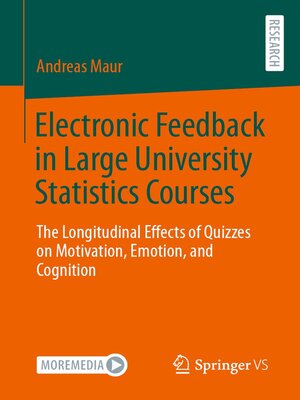Electronic Feedback in Large University Statistics Courses
ebook ∣ The Longitudinal Effects of Quizzes on Motivation, Emotion, and Cognition
By Andreas Maur

Sign up to save your library
With an OverDrive account, you can save your favorite libraries for at-a-glance information about availability. Find out more about OverDrive accounts.
Find this title in Libby, the library reading app by OverDrive.



Search for a digital library with this title
Title found at these libraries:
| Loading... |
Digital tools and pedagogies in public higher education are unfolding their potential by providing large groups of students with automated, continuous learning and feedback opportunities. However, most of the existing studies are cross-sectional, unidirectional and focus on a limited selection of relevant target variables and instructional features. In a field study, Andreas Maur used longitudinal latent structural equation modelling with a large sample of students to analyse the interrelations between formative feedback from electronic quizzes and different facets of the control value theory of achievement emotions. The results suggest that regular quizzes most consistently improve self-efficacy, anxiety, effort, course enjoyment, and hopelessness over time. Only feedback effects related to intrinsic motivation were consistently less effective for female and less proficient students, and for students in traditional versus flipped classrooms. These findings highlight the need to scale up formative feedback in higher education and to cultivate feedback systems with higher levels of sophistication, adaptability, and gamification mechanics.






